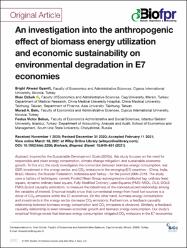An investigation into the anthropogenic effect of biomass energy utilization and economic sustainability on environmental degradation in E7 economies
Özet
Abstract: Inspired by the Sustainable Development Goals (SDGs), this study focuses on the need for
responsible and clean energy consumption, climate change mitigation, and sustainable economic
growth. To this end, the study investigates the connection between biomass energy consumption, real
GDP, investment in the energy sector, and CO2 emissions in the emerging (E7) countries – China, India,
Brazil, Mexico, the Russian Federation, Indonesia and Turkey – for the period 2000–2018. The study
uses a battery of techniques, namely Pooled Mean Group-autoregressive distributed lag, ordinary least
square, dynamic ordinary least square, Fully Modified Ordinary Least Squares (PMG-ARDL, OLS, DOLS
FMOLS) and causality estimators, to measure the robustness of the conceptualized relationship among
the variables of interest. Empirical results show that conventional energy from fossil fuel sources is a
driver of CO2 emissions within the E7 economies. On the other hand, biomass energy consumption
and investments in the energy sector decrease CO2 emissions. Furthermore, a feedback causality
relationship between biomass energy consumption and CO2 emissions is observed. Similarly, a feedback
causality relationship is seen between economic growth and biomass energy consumption. Our study’s
empirical findings reveal that biomass energy consumption mitigated CO2 emissions in the E7 economies that were examined, suggesting the pivotal role for biomass energy consumption in creating an ecofriendly environment and environmental sustainability. This requires investment from the private sector,
stakeholders, and government administrators in cleaner energy technologies initiatives like biomass.
Cilt
15Sayı
3Bağlantı
https://hdl.handle.net/11363/4990Koleksiyonlar
Aşağıdaki lisans dosyası bu öğe ile ilişkilidir:


















